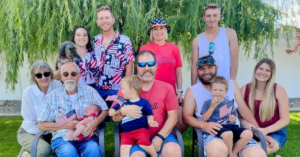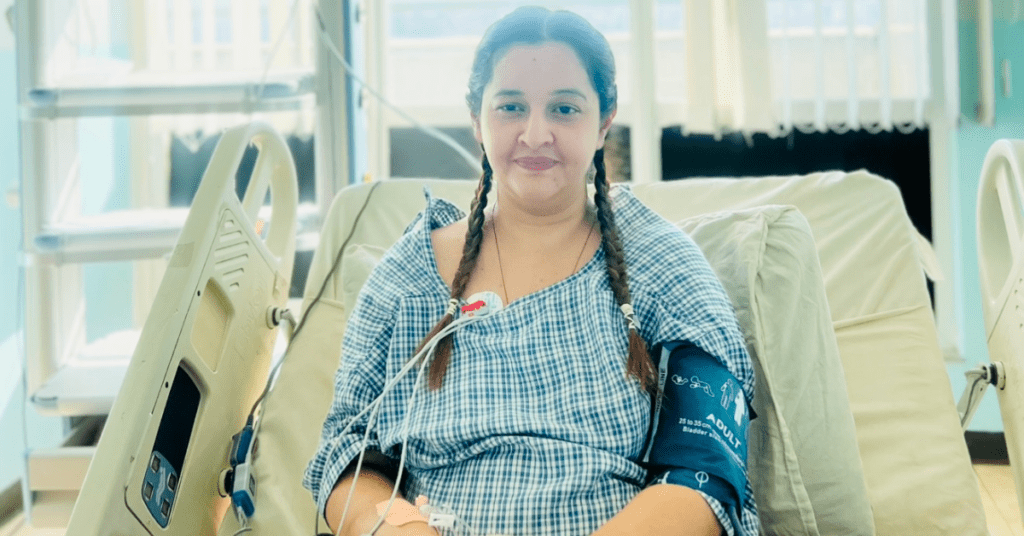Hello everyone, I used to live away from my home in Pokhara with my 3-year-old son for my job. I was a very confident girl — I loved dancing, not professionally, but for my own happiness. For me, it was a form of yoga and meditation. I had always been a very healthy person, never having any long-term illnesses. One day, I had a high fever. After about a week, the fever subsided and I returned to work as usual. Everything seemed normal at first. But after about 15 days, I started to feel that something was wrong with my body. I felt dizzy, weak, and just not like myself.
One day while writing in my diary, I suddenly found I couldn’t write properly. I got scared — something was definitely not right. I searched my symptoms on the internet, and it suggested anxiety. Since I was living away from home, I thought maybe it really was anxiety. After 10 days, I returned home and told my husband about everything I was experiencing. The next day, we went to the hospital. The physician referred me to a psychiatrist, who also said it was anxiety. They did a plain MRI, which came back normal. I was relieved at first, thinking nothing serious was wrong. I started taking psychiatric medicines, but day by day, my condition worsened. I slowly lost my ability to speak properly, to walk, and even my vision became blurry. I felt extreme dizziness and many other symptoms that are hard to explain. We visited the psychiatrist every 2–3 days, but she kept saying it was just anxiety. Despite taking the medicines, I was getting worse.
One day, I begged my husband to take me to another hospital for a second opinion. Thankfully, we did. There, they realized that it wasn’t anxiety at all — it was a neurological problem. We saw a neurologist, who told us it was already quite late, and we were terrified. He admitted me to the hospital immediately, performed a lumbar puncture (spinal tap) and sent the sample to India for further testing. They ran many tests and another MRI, but still couldn’t find the exact cause. After 8 days in the hospital without answers, and at my request, I was discharged and went home. But my condition kept getting worse. My husband consulted an Indian neurologist online, who advised us to give it more time. But seeing me deteriorate, my husband took me to Grande International Hospital — the most expensive hospital in Nepal.
There, Dr. Raju (a neurologist) finally diagnosed me with post-infectious Cerebellar Ataxia. He started me on steroid treatment immediately. I received IV steroids at home through a nurse. After 7 days, during a follow-up, Dr. Raju didn’t see much improvement, so he recommended IVIG treatment. I received 5 doses of IVIG in the ICU. After completing the IVIG treatment, my vision improved, and some of my ability to walk returned. I was discharged and continued oral steroids for 20 more days, which caused my face to swell as a side effect.
Now, I am doing physical therapy at the gym to work on walking and balance exercises. I am also practicing my speech daily. Even though I am not the same as before — my body is still broken, I don’t look the same, I can’t dance the way I used to — I am trying to stay strong. I had to leave my job, and some days I feel deeply frustrated and heartbroken. But I am still fighting, hoping and waiting for the day when I can dance, walk, and talk just like I used to.
When Were You Diagnosed? Which Type (If Known)?
Post infectious Cerebral Ataxia (after 2 months of infected with Ataxia)
How Has Ataxia Impacted Your Life?
I had to leave my job, which has affected me financially. I am unable to work , and I can no longer cook like I used to. Ataxia has impacted many aspects of my personal life.
Share Your Advice – How Can Others Support Someone with Ataxia?
Accept the situation, keep exercising to work toward full recovery, and stay strong and hopeful.
Disclaimer: The views and opinions expressed in this story are those of the individual member and do not necessarily reflect the views of the National Ataxia Foundation (NAF). Any medical information shared in this story is based on personal experience and has not been reviewed or endorsed by NAF or a medical professional. Always consult with your own physician or qualified healthcare provider before making any changes to your care or treatment plan.
What is Your Ataxia Story?
As an organization dedicated to improving the lives of those affected by Ataxia, we believe that each story has the power to inspire, connect, and empower others. We invite you to share your personal Ataxia journey with us.
Are you here to read the personal stories, but haven’t yet joined as a member? We hope you find comfort in reading about the experiences of others on their Ataxia journey. We invite you to join as a member to receive a new member story each month. It’s free, and you’ll be kept up-to-date on the latest developments in the Ataxia community.
Recent Member Stories

Denny
My name is Denny and I am 71 years old living in a small town in Northern Minnesota. I have had a diagnosis of Ataxia Read More…

Liliana Haefliger
One day, about 25 years ago, I suddenly saw double after the second sip of white wine. Then I started seeing double not only when Read More…

Dušan Stojanovich
“His Light Endures”: Honoring Dušan Through Art and Advocacy By Dr. Nanette Presswell My partner Dušan was an extraordinary person—deeply creative, endlessly curious, and full Read More…

Marius
My Ataxia Journey: Sailing Uncharted Waters My name is Marius, and I live in Romania. I’m 64 years old, and I’ve always been an active, Read More…

Kamal Randhawa
I have a history of Ataxia. On my father’s side, all aunts and uncles are affected, their offspring too. We all have Ataxia. I was Read More…

Bev Schmutz
Hi! I was diagnosed in 2010. I worked for a well known insurance carrier. I had breast cancer in 2008 and received Chemo therapy, radiation Read More…




